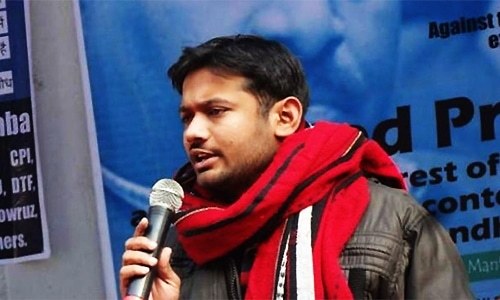SEVERAL bright yellow barricades of the Delhi police divided the students into two neat groups. A few policemen stood around watching the proceedings; some looked bored with all that was happening around them: sloganeering, thunderous claps and songs.
On one side of the barricades were supporters of the Akhil Bharatiya Vidyarthi Parishad (ABVP), a right-wing students’ organisation, and on the other, ‘Friends of JNU’ (Jawaharlal Nehru University). By the time I reached the protest area outside the arts faculty at Delhi University on Thursday (Feb 18), things had warmed up quite a bit: a woman supporter/member of a largely male contingent of the ABVP was shouting about the latter’s pet subject/project: nation, nationalism and patriotism. The other group — many of the participating students had no particular party affiliation — was singing the world’s best-known protest song: We shall overcome. There were many eager onlookers who seemed a bit unsure of which side to take and so kept themselves busy with clicking selfies and recording the ‘historic’ proceedings on their smartphones.
In the last one week, similar protests and counter-protest meetings have been happening in JNU, different parts of Delhi and across university campuses in the country after the Delhi police, who report to the BJP-led central government and not to the city government, arrested Jawaharlal Nehru University students’ union president Kanhaiya Kumar on Feb 12 on charges of sedition, an allegation they are now finding difficult to prove.
The problem started on Feb 10, when a protest meeting was organised in JNU, a state-funded central university and a left stronghold, on the third anniversary of the execution of Afzal Guru, a militant allegedly involved in the attack on the Indian parliament in 2001. The protesting students and some outsiders shouted anti-India slogans and called Afzal Guru a martyr. The police based their allegations on a video footage which showed Kumar raising anti-India slogans, but forensic experts brought in by a TV channel last week said that the videos were doctored. The Delhi police, who have serious amount of egg on their face, have yet to comment on this grave counter-charge.
“We are not here to indulge in violence … but we will exercise our right to protest and demand the release of Kumar … in fact this protest meeting is not only about him … we have to protect our democratic future,” Suanina Rathore, a BA student at Delhi University and participant in the protest, told me: “I never thought I will do this … I have never been involved in students politics but what the police did is just too much … we can’t give up the right to dissent.”
In fact, the reaction of the students in DU has surprised many in the faculty. “These are young students and not very politically conscious … but look at them … this issue has galvanised them … I am incredibly proud of them. There is hope,” Rathore’s professor, A. Kumar, told me over a piping hot cup of tea.
After having watched the protests from the ‘pro-left’ side, I decided to go to the other side.
Before I could zero in on a candidate to interview, a young boy wearing a saffron sweatshirt stopped me. “There cannot be any negotiations when it comes to the country … Bharat Mata ki jai,” he delivered his message and went back to the protests before I could ask him anything further.
A day later, I joined a protest march by JNU students and citizens of Delhi. The venue was significant: central Delhi. This is where the government offices and parliament are located. Most participants — JNU students and citizens of Delhi — were clear that Kumar’s case is part of a bigger challenge.
“The arrest of Kumar is a part of a bigger, insidious plan. JNU has a different tradition and students are very politically conscious and left-oriented … that’s how it has always been … the government wants to break that stronghold as part of its saffronisation programme,” said Dawa Tsering, a young executive.
Tsering is correct. To understand the unfolding story, it is important to understand the background of the university, the reason why it is the target.
In an insightful piece — ‘JNU and our democracy’ — historian and professor emeritus of JNU, and one of the founder-members of the university Romila Thapar writes: “The BJP-RSS government currently in power is unable to have a dialogue with an institution such as the JNU and other similar universities such as the Hyderabad Central University. The emphasis from the start in such universities has been on questioning existing knowledge, exploring new knowledge and relating knowledge to the existing reality. This is the very opposite of merely handing down selected information without questioning it. This is a problem that the BJP-RSS government has to face with a number of pace-setting prestigious centres of learning that do not substitute catechism for learning, and instead demand the right to debate a subject that may be thought to be blasphemous to the nation as defined by Hindutva. So the alternative is to try and dismantle such centres of learning by creating disturbances. This will eventually prevent them from functioning as they are intended to do.”
The JNU fracas will certainly be not the last one. This battle of ideas and ideologies will surface on many other campuses in days to come.
KumKum Dasgupta is associate editor with the Hindustan Times in New Delhi.
Twitter: @kumkumdasgupta
Published in Dawn, February 21st, 2016














































